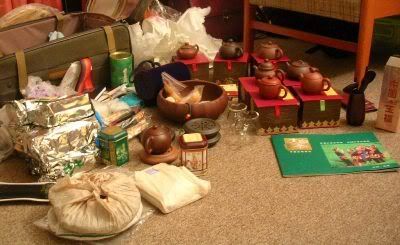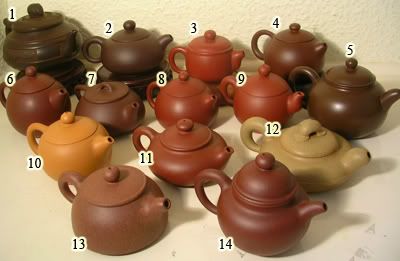The porter (who holds our mail) is getting a little suspicious. He raises eyebrows every time my mail yields yet more plastic bags full of dark leaves. On arriving yesterday, the triple whammy pictured below nearly pushed him over the edge...

Many thanks to Carla, Dustin, and the-artist-previously-known-as-Psychopuncture for the teas!
Thankfully, the porter didn't get a chance to see inside Xiaomao's luggage on her return to England last night. After a month of visiting her family in Henan Province (for which I couldn't get away this year), her happy return was accompanied by suitcases weighed down with what appears to be half of Maliandao:
 Dedicating the new teapots to teas was not an easy task, but we've provisionally opted for the following. We'd very much appreciate your comments and opinions on our assignments:
Dedicating the new teapots to teas was not an easy task, but we've provisionally opted for the following. We'd very much appreciate your comments and opinions on our assignments:
(1) Old shengpu, (2) Middle-aged shengpu*, (3) Old shengpu*
(4) Young shengpu*, (5) Young shengpu, (6) Heicha
(7) Shupu*, (8) Hongcha, (9) Oriental Beauty*
(10) Qingxiang wulong, (11) Baozhong*, (12) Nongxiang wulong
(13) Dancong*, (14) Wuyi yancha*
(4) Young shengpu*, (5) Young shengpu, (6) Heicha
(7) Shupu*, (8) Hongcha, (9) Oriental Beauty*
(10) Qingxiang wulong, (11) Baozhong*, (12) Nongxiang wulong
(13) Dancong*, (14) Wuyi yancha*
Starred pots are Xiaomao's new acquisitions. (1) and (5) are going to be retired to "non-gongfucha status": the former is too large, at 35cl (yet is very pretty, being a wedding gift), while the latter is simply too unpleasant to look at or use.
I was struck by the fact that, for the price of the "factory pots" available from Internet vendors, Xiaomao found beautiful, high-quality artisan pots that positively stand out from the crowd. I sincerely recommend a holiday to China, if only to find some decent teaware at 10-20% of Internet prices.
What was particularly striking was that a $30 "Internet-pot" can be purchased for as little as $2 - and that's retail, and from the relatively-expensive city of Beijing. It's an interesting business model.
Notes on teas to follow. Stay tuned for samples, if they turn out to be decent!

Oooooooh... I am so jealous. :)
ReplyDelete-Brent
As far as pot choices go, I would swap 13 and 3. 11 looks like a it would work well with baozhongs. Do you have a seprate yixing for aged zhong?
ReplyDeleteHmm! Interesting comment, thank you. What causes you to think about the 13/3 swap? The colour and texture of the clay of 13 goes rather nicely with the fruitiness of the dancong. :)
ReplyDeleteWe don't have a separate aged baozhong pot, but we drink so little of it. If the genre is true to the 1980s baozhong that we recently had from Houde, we'll just keep it in a gaiwan for now - or the nongxiang pot (12).
Toodlepip,
Hobbes
The mailman has asked about the packages from China before. Once I told him what they were, he started calling these packages "the good stuff." It made me think we were talking about another green substance.
ReplyDeleteWhat is wrong with #5 that it is unpleasant to look at or use?
ReplyDeleteDustin,
ReplyDeleteAt least you know who squealed if you have the FBI breaking your door down!
Doddy,
#5 looks acceptable in the photograph, perhaps. In real life, it's clearly a poor piece, though. Let me tackle them one by one, as it's an interesting question.
Material
The material used to make it is very high in "mud" and very low in "clay", and it feels and looks like it: the colour is dull, the weight is light, the material is highly non-porous. Consequently, it loses heat rapidly, and does little positive to affect the tea. When you strike it, the poor materials are evident as it sounds like a brick.
Construction
It's the very worst of factory manufacture in its appearance: the spout, body, and handle are clearly three disjoint and separate parts that have been affixed to one another at the end of the process, rather than appearing as one harmonious whole. It has the feeling of a school-boy's pottery project.
And finally...
The vendor, who shall remain nameless out of common decency, claimed that it was "excellent manufacture", and charged more for it than almost all of our artisan pots recently purchased in Beijing. When I lifted it from the parcel in which it arrived, I was mightily disappointed, and promptly assigned it to my most brutal, unpleasant type of tea (young shengpu). I won't miss this teapot - everything that's bad about Internet teapot merchants is met in this hideous little cretin.
Disclaimer: there are some great Internet vendors out there.
Toodlepip,
Hobbes
not to get you to name names, but everything your saying about #5 reminds me of some zisha I picked up from Pursuit of tea...
ReplyDelete-Ian
Daaaang. That's some booty Xiaomao hauled back. I very much second Brent's jealous comment.
ReplyDeleteIndeed, you can find reasonable teapots from China for a very very low price. That said... the good clay still costs money, but one could find decent pots at the $25-$35 range or so, as long as it's small. Bigger ones cost more...
ReplyDeleteHow you'll juggle all these pots might be a difficult thing to do though :)
Ian,
ReplyDeleteI've not bought anything from Pursuit of Tea, so they're in the clear!
Mary,
Have you ever considered flying over for a week or so? It makes a great trip.
LZ,
Have you ever been to Yixing? Xiaomao suggested heading there the next time that we return.
Toodlepip all,
Hobbes
Sigh...someday when I have a real 'grown-up' job, I will give in to the wanderlust. Until then, I must let the little green monster gnaw away at my soul.
ReplyDeleteYes, all the leaves in plastic baggies...and in my office nonetheless! It does arouse suspicion, but whenever people inquire about it, I offer to brew them a cup, and that goes a long way towards rumor control. I'm somewhat amazed that the packages from Kunming have arrived untampered with so far.
ReplyDeleteBeautiful pots! I really like #13, probably because I'm partial to grainy, textured finishes, and its wide opening makes it ideal for dancong oolongs, only you'll have to use a good amount of leaf - it looks fairly large, about 220cl?
The magic of perspective makes it looks like a whopper - it's a 12cl pot, in fact. :)
ReplyDeleteToodlepip,
Hobbes
Back to oogling your yixing collection, I just now noticed #3 - what a cutie! And, as a middle-aged sheng pot, it'll see a lot of use, no doubt. I'm just curious why #2 and #3 are not reversed - #3 just seems somehow more special, like old sheng...
ReplyDeleteCarla,
ReplyDeleteI can see exactly what you mean. #3 looks very pretty in the picture. It's also an ancient design. The lid is the same radius as the barrel, which is quite unusual - you literally uncap the cylinder when removing the lid.
What doesn't come across in the photograph quite so well is the sheer awesomeneity of #2. When all of the new pots were sitting together, #2 just stood out from the crowd. It's very dense in material, very well constructed, and just darned attractive in a very physical way.
As you say, I don't think #3 has quite found its spiritual home, but for old shengpu, "there can be only one" - and that one is #2 in this case. :)
Toodlepip,
Hobbes
P.s. #4, a very satisfying Xishi-style pot, of decent construction, cost just £1 ($2). Of course, it's a factory pot, but such a lovely little fellow. Next time we go, I'll bring back and bunch as gifts for the teafolk, I think - the sexiness:price ratio is inordinately high.
I'll have to take you word for it WRT #2. Meanwhile I'm enjoying the photograph of #3 in your recent Mengku Yuan Ye Xiang review....
ReplyDeleteActually, we have since swapped #2 and #3 around, by sheer chance - Xiaomao, like you, thought it would be a good idea.
ReplyDeletePrimarily due to its tiny size, which will do well for the invariably tiny samples of aged tea that I come across, but also because (as you pointed out) it looks ancient.
If two women are telling you the same thing... what's a man to do? :)
Toodlepip,
Hobbes
To Hobbes
ReplyDeleteI would very much like to learn more about what types of clay are suited to which kinds of tea - any suggestion as to where I might learn more about this? I've learned from brewing that the pots shouldn't be too big, and my best pot is 120 ml which I've used for pu'er 10-15 years old.
Best wishes!
Terje
Dear Terje,
ReplyDeleteLearning about clay is a difficult endeabour in English - the books are mostly Chinese. Limited information is available from vendors, but it is patchy and often incorrect. This is one of the areas in which some good translations of Chinese literature would be very welcome.
Best wishes,
Hobbes